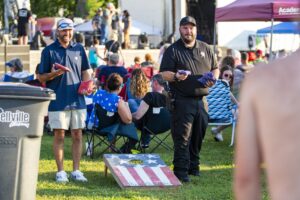Maj. William Russell: City owes its name to pioneer settler
PROGRESS 2023: What’s In A Name
As recounted in an article in the Franklin County Times Sesquicentennial special section, Russellville was incorporated in 1819. It was first governed by a board of trustees, elected every year. In that article, Maj. William Russell is referred to as simply “one of the pioneers” of the community. The good major is the namesake of Russellville, credited with founding the community.
“Place Names in Alabama,” by Virginia O. Foscue, describes Russellville like this: “Settled in 1815 by William Russell, chief scout for Andrew Jackson in the Creek Indian War of 1813-14. Area first known as Russell’s Valley. In 1819 the town was inc. as RUSSELLVILLE.”
As recorded by historical documents, it was when Gen. Andrew Jackson was cutting the Jackson Highway to New Orleans, through Franklin County, Russell – one of Jackson’s most trusted scouts – discovered the desirability of this region. “Major Russell saw that it was attractive territory. When the road was completed he came back and built the first pioneer cabin two and a half miles east of the present site of Russellville. The section around the present site of Russellville was called Russell Valley in honor of the man who built the first pioneer cabin.”
He also built a trading post in the same area. As noted by “The Heritage of Franklin County, Alabama,” other pioneers built their log cabins in proximity to the trading post, and native Americans would visit to trade furs for guns, knives and axes. As the town began to grow up, however, Russell apparently felt stifled by the influx of other people. He moved out to Newburg, where he later died and is now buried.
“Meanwhile,” the sesquicentennial article notes, “sickness, probably malaria, struck the little settlement he had left behind, and the townsfolk moved westward to the present location of Russellville.”
A 2005 Franklin County Times article quotes descendant Richard Wagner as saying Russell likely chose the area to settle because of the amazing scenery – which is echoed in other historical accounts about Russellville’s founding. “Newburg’s scenery was the pick of the lay of the land,” said Wagner, who had spent a considerable amount of time researching his family history. “He liked a spot on a high lay of a creek, flat ground, farmland and some bottomland and hills.”
Before his death, Russell “saw the settlement become the most important town and the county seat of a newly created Franklin County in a newly organized area,” according to “The Heritage of Franklin County, Alabama.” Russellville was incorporated Nov. 27, 1819 – three weeks before Alabama became a state.
In “The Heritage of Franklin County, Alabama,” the War Department record refers to Russell as “captain of a company of mounted spies, Tennessee, from October 4, 1813, to April 4, 1814” and as a “major of a separate battalion of Tennessee mounted riflemen from September 28, 1814, to March 27, 1815.”
According to a letter transcribed in 1932 and reprinted in part in the same 2005 FCT article, Jackson held precious memories of Russell and their service together. He wrote to Russell’s son that, “My memory for your father and his noble deeds in War is as fresh as it was when he was so gallantly loading on his company to battle and to victory – I never can forget him … and the arduous and long, and gallant service of your father throughout the whole War.”
In July 2007 the city found another way to preserve its history with the addition of a historical marker downtown, at the intersection of North Jackson Avenue and Lawrence Street East, thanks to the effort of longtime resident and author Homer Grissom with the aid of Franklin County Archives director Chris Ozbirn. The marker, and other historical markers in the city, note Russell’s importance to the city’s history.
According to an obituary noticed printed in The Tuscumbian, Russell “died at his residence in this county, on Wednesday the 16th inst. Major Wm Russell aged about 63 years. In the demise of this man, Society has lost an ornament – the poor of his neighborhood, a kind benefactor – the survivors of his family, an indulgent protector, and his country a patriot. On our western frontier from his boyhood, the opponent, but never an unrelenting victor – An officer in the late Creek and Seminole wars, he had the friendship of his commander and the love and respect of his men. These best exhibit his character as a soldier.”
Russell was laid to rest in the Denton Hollow Cemetery in East Franklin. His headstone notes his military service and death date of Feb. 16, 1825.













